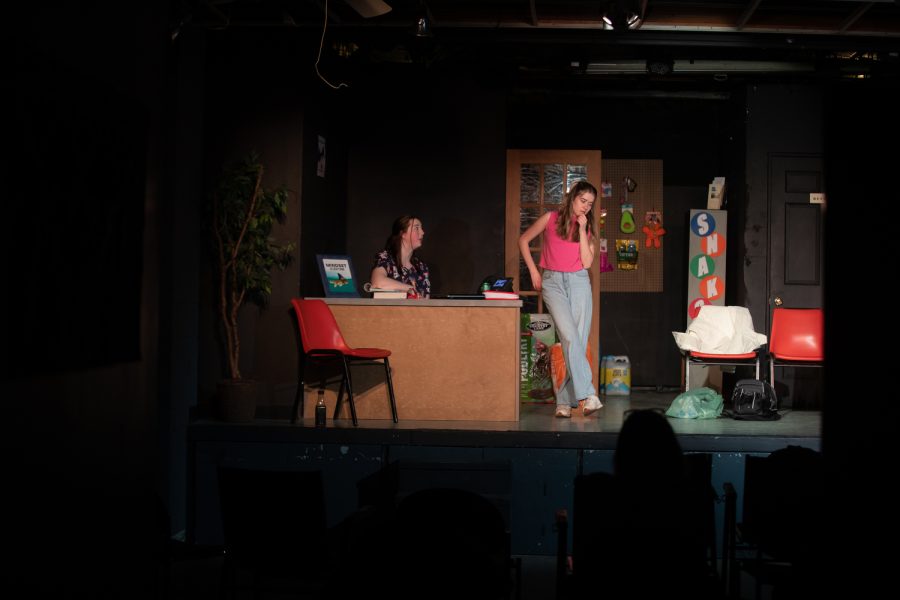Dreamwell Theatre presents world premiere of ‘the fog comes on little cat feet’
On Feb. 24, Dreamwell Theatre presented the world premiere of “the fog comes on little cat feet,” a play by Amanda Keating about experiences of love and loss shared between strangers.
Emma Hughs and Jennifer Hogan perform during a rehearsal of The Fog Comes on Little Cat Feet in the Artifactory building on Wednesday, Feb. 22, 2023.
March 1, 2023
A small room is lined with chairs and lit by fluorescents, filled with the sounds of a vending machine spitting out snacks, a telephone ringing off the hook, and hushed conversations between anxious animal owners.
On Feb. 24, Dreamwell Theatre presented the premiere of “the fog comes on little cat feet.” This production was written by playwright Amanda Keating, who is pursuing an Master of Fine Arts in Playwriting from the Iowa Playwrights’ Workshop. The play will also be performed on March 4-5.
Keating has written several plays over the last 12 years with various organizations and theater companies producing them. One of her productions entitled “this movie” was a winner at the 2017 Off-Off Broadway Festival.
Last year, a reading of “the fog comes on little cat feet” was read for a workshop at the University of Iowa. The play’s Dreamwell director, Michele Payne Hinz, participated in the reading and asked Keating if she would be interested in presenting the play at Dreamwell.
“the fog comes on little cat feet” is about the lives of seven people who meet in the waiting room of a veterinary hospital in a small town. Some of these people knew each other while others were strangers, but they all shared concerns for their animals.
Over the course of this fateful night, each character stepped into the spotlight and shared their personal story. By the end of the play, audiences learned that everyone in the waiting room was familiar with both loss and love in some way.
Once a cat owner herself, Keating is accustomed to veterinary hospitals, where she frequently sat in waiting rooms while her cat’s poor health was seen to.
“I always found those places to be sort of emotional being around other people. I wasn’t sort of talking to them,” Keating said. “It was only an emotional charge from how attached everyone was to their animal and how the space really stresses vices, so I always felt it was a really compelling space.”
RELATED: The stories of four women are woven together in Dreamwell Theatre’s ‘The Revolutionists’
Brothers Robbie and Richie, played by Robbie Williams and Eli Campbell respectively, were characters in the play who owned Pete, a cat with IBS.
Robbie’s girlfriend Kayla, played by Emma Hughes, was the vet-in-training at the hospital who explored love by taking care of animals. She and WIlliams spent part of the night navigating the uncertain future of their relationship.
Sue, played by Mary Lukas, was awaiting news about her cat Nut, who suffered an injury to his tail. Meanwhile, her close friend Arlene, played by Paula Grady, was flitting between surgical operations after the alpacas on her farm were attacked by a wild animal.
This is Lukas’s fifth theater production, having performed in both onstage and backstage roles on other projects. She worked as a speech pathologist in public schools and at the UI before retiring and has been involved with local community theater ever since.
Other actors like Henry Hunnicutt were fairly new to the stage. Hunnicutt played Dr. Ben, the veterinarian and devoted owner of the dog he shared with his wife, from whom he had separated. Hunnicutt is a third-year transfer student majoring in screenwriting and theater at the UI. This is his first production in Iowa City.
“It’s really been fun,” Hunnicut said. “I didn’t think I’d continue to have these moments of light funniness within hearing the script.”
He especially praised the writing of the character Amy, played by fellow UI student Jennifer Hogan.
Amy was a college student whose innocence and bubbliness drew the other characters to her. Though her personality left audiences laughing, her story also left them teary-eyed as the play came to a thought-provoking conclusion.
Iowa City local Jen Wehr attended the play to see Lukas perform. She enjoyed the production and appreciated the efforts of everyone involved. According to Wehr, supporting local theater is important because it has become more financially accessible to the public than larger theaters and is still rich with talent.
“It’s a classic theater here,” Wehr said. “It’s good tradition and it’s good for the community.”



